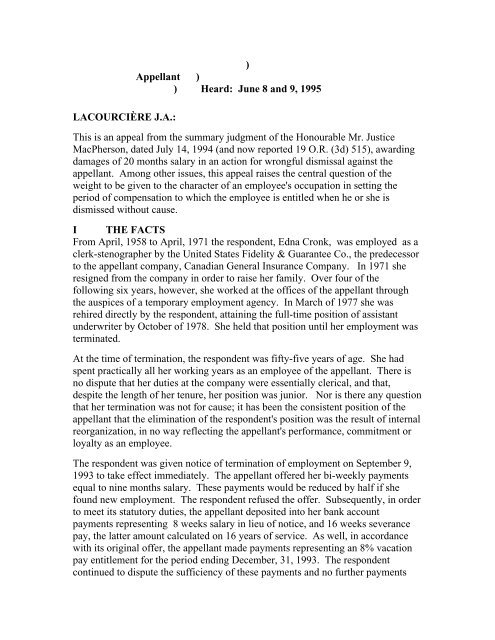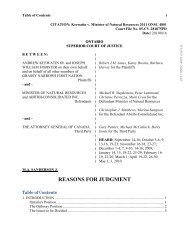Cronk v. Canadian General Insurance Co., 1995 CanLII 814 (ON CA)
Cronk v. Canadian General Insurance Co., 1995 CanLII 814 (ON CA)
Cronk v. Canadian General Insurance Co., 1995 CanLII 814 (ON CA)
Create successful ePaper yourself
Turn your PDF publications into a flip-book with our unique Google optimized e-Paper software.
LACOURCIÈRE J.A.:<br />
)<br />
Appellant )<br />
) Heard: June 8 and 9, <strong>1995</strong><br />
This is an appeal from the summary judgment of the Honourable Mr. Justice<br />
MacPherson, dated July 14, 1994 (and now reported 19 O.R. (3d) 515), awarding<br />
damages of 20 months salary in an action for wrongful dismissal against the<br />
appellant. Among other issues, this appeal raises the central question of the<br />
weight to be given to the character of an employee's occupation in setting the<br />
period of compensation to which the employee is entitled when he or she is<br />
dismissed without cause.<br />
I THE FACTS<br />
From April, 1958 to April, 1971 the respondent, Edna <strong>Cronk</strong>, was employed as a<br />
clerk-stenographer by the United States Fidelity & Guarantee <strong>Co</strong>., the predecessor<br />
to the appellant company, <strong>Canadian</strong> <strong>General</strong> <strong>Insurance</strong> <strong>Co</strong>mpany. In 1971 she<br />
resigned from the company in order to raise her family. Over four of the<br />
following six years, however, she worked at the offices of the appellant through<br />
the auspices of a temporary employment agency. In March of 1977 she was<br />
rehired directly by the respondent, attaining the full-time position of assistant<br />
underwriter by October of 1978. She held that position until her employment was<br />
terminated.<br />
At the time of termination, the respondent was fifty-five years of age. She had<br />
spent practically all her working years as an employee of the appellant. There is<br />
no dispute that her duties at the company were essentially clerical, and that,<br />
despite the length of her tenure, her position was junior. Nor is there any question<br />
that her termination was not for cause; it has been the consistent position of the<br />
appellant that the elimination of the respondent's position was the result of internal<br />
reorganization, in no way reflecting the appellant's performance, commitment or<br />
loyalty as an employee.<br />
The respondent was given notice of termination of employment on September 9,<br />
1993 to take effect immediately. The appellant offered her bi-weekly payments<br />
equal to nine months salary. These payments would be reduced by half if she<br />
found new employment. The respondent refused the offer. Subsequently, in order<br />
to meet its statutory duties, the appellant deposited into her bank account<br />
payments representing 8 weeks salary in lieu of notice, and 16 weeks severance<br />
pay, the latter amount calculated on 16 years of service. As well, in accordance<br />
with its original offer, the appellant made payments representing an 8% vacation<br />
pay entitlement for the period ending December, 31, 1993. The respondent<br />
continued to dispute the sufficiency of these payments and no further payments
















